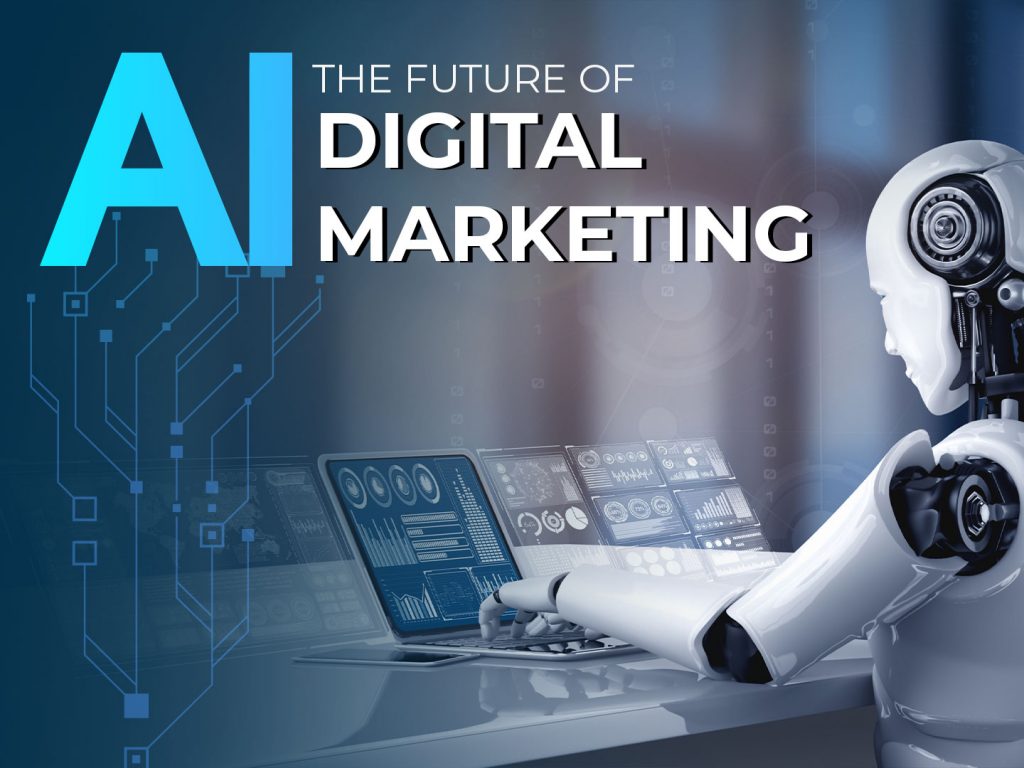In today’s digital-first world, businesses are constantly competing to capture the attention of their target audience. Consumers are no longer satisfied with generic advertisements or broad marketing campaigns — they want personalized, seamless, and engaging experiences. This is where Artificial Intelligence (AI) comes in. AI is not just a buzzword anymore; it’s transforming how brands approach marketing by providing smarter tools, actionable insights, and highly efficient processes.
At Bits Tomato, we believe that AI is one of the most significant game-changers in digital marketing. Let’s explore how AI is shaping this space, the benefits it brings, and why businesses should embrace it.

What is Artificial Intelligence in Marketing?
Artificial Intelligence refers to the use of machine learning algorithms, natural language processing, and data-driven models to mimic human intelligence. In digital marketing, AI enables businesses to process massive amounts of data, uncover customer patterns, and automate repetitive tasks. In simple terms, it allows marketers to deliver the right message to the right audience at the right time, improving efficiency and driving growth.
Key Roles of AI in Digital Marketing
1. Personalized Customer Experiences
One of the most powerful applications of AI is personalization. AI analyzes customer behavior, purchase history, and browsing activity to tailor experiences for each individual. For example, e-commerce sites like Amazon recommend products based on your previous searches, while streaming platforms like Netflix suggest shows you’re likely to enjoy. This type of hyper-personalization improves engagement and significantly increases conversion rates.
2. Predictive Analytics
AI helps marketers go beyond understanding what customers are doing now — it predicts what they will do in the future. Through predictive analytics, businesses can anticipate customer needs, forecast demand, and design strategies around expected behavior. For instance, AI can predict which product categories are likely to trend during a particular season, allowing brands to optimize inventory and campaigns accordingly.
3. Chatbots and Virtual Assistants
AI-powered chatbots have become a cornerstone of customer service in digital marketing. They respond instantly, handle multiple queries at once, and work 24/7. Beyond answering FAQs, modern chatbots can recommend products, capture leads, and even process orders. By integrating chatbots, businesses enhance customer satisfaction while reducing the burden on support teams.
4. Content Creation and Optimization
Content remains the heart of digital marketing, and AI makes it smarter. AI-driven tools can generate blog drafts, ad copy, and even video captions. More importantly, they can analyze which type of content resonates best with specific audiences. For example, AI can help determine whether short-form videos, long-form articles, or interactive posts perform better for your target demographic. This insight helps marketers create content strategies that deliver measurable results.
5. Programmatic Advertising
Buying ads has traditionally been a manual and time-consuming process. With AI-driven programmatic advertising, this process becomes automated and highly efficient. AI analyzes audience data in real-time, ensuring that ads reach the right people on the right platforms. This not only improves targeting but also reduces wasted ad spend, delivering better ROI.
6. Enhanced Customer Insights
AI’s ability to process vast datasets in seconds makes it an invaluable tool for understanding customers. Businesses can uncover insights such as demographics, purchasing habits, and even emotional sentiment. These insights allow marketers to build detailed customer profiles and craft strategies that align closely with customer needs.
Benefits of AI in Digital Marketing
- Efficiency: Automates repetitive tasks such as scheduling posts, sending emails, or analyzing data.
- Accuracy: Reduces human error in campaign planning and execution.
- Scalability: Manages large campaigns across multiple platforms effortlessly.
- Higher ROI:Improves targeting, reducing wasteful spending on irrelevant audiences.
- Improved Customer Relationships: Builds trust through timely, relevant, and personalized interactions.
The Future of AI in Digital Marketing
The role of AI in marketing is only going to grow stronger. Emerging trends include:
- Voice Search Optimization :With smart assistants like Alexa and Siri becoming popular, voice-based queries are on the rise. AI will help businesses optimize content for this shift.
- Visual Search:Customers can now search using images rather than text, and AI-powered platforms will refine these capabilities further.
- Hyper-Personalization: Moving beyond basic recommendations, AI will soon deliver individualized campaigns based on real-time context, mood, and behavior.
- AI-Generated Video Content: From automated editing to personalized video ads, AI will transform how brands use video in campaigns.
Final Thoughts
Artificial Intelligence has moved beyond being a futuristic concept — it’s a practical, powerful tool that businesses are using today to stay competitive. From personalizing experiences to automating advertising, AI is shaping the future of digital marketing.
For brands, the message is clear: those who embrace AI now will have a significant advantage over those who delay. By blending AI-driven insights with human creativity, businesses can create marketing campaigns that are smarter, more efficient, and more engaging than ever before.At Bits Tomato, we believe AI isn’t replacing marketers; it’s empowering them to deliver their best work. The future of digital marketing is intelligent, and it’s already here
Leave a Reply